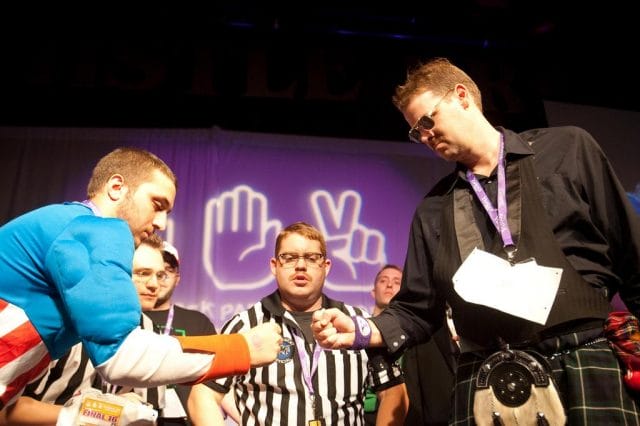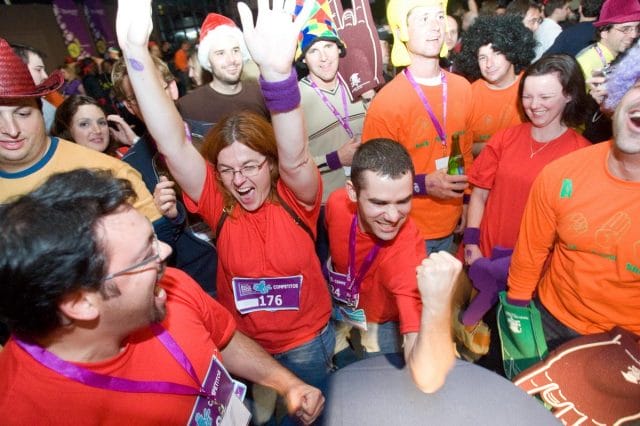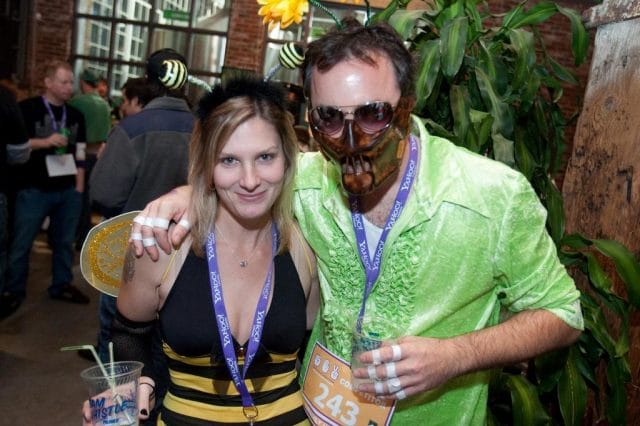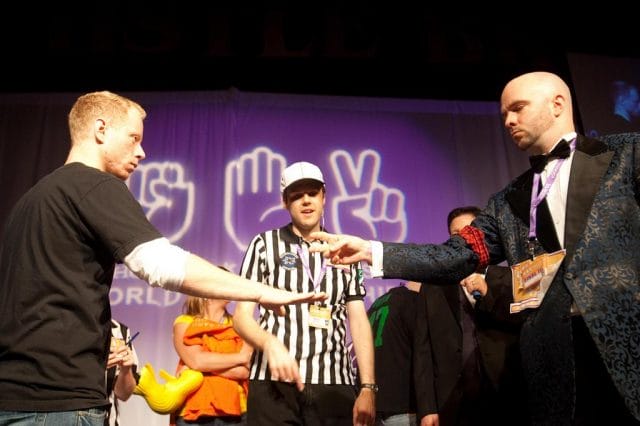
This article was written by Alex Mayyasi, a Priceonomics staff writer
All pictures are by Mark Coatsworth and used with permission of the World Rock Paper Scissors Society
![]()
“You all got a minute for a game of Rock Paper, Scissors?” Jason Simmons asks.
Simmons is in a mall, challenging strangers to games of Rock Paper Scissors. He addresses his question to a man in a cowboy hat. Then, making the sign for scissors with his fingers, Simons adds, “So you throw on four, right?”
The two men count, and on “four,” Simmons defeats the man in the cowboy hat by throwing rock to his scissors.
You may think that Simmons got lucky, and that he had an equal chance of winning, tying, or losing. Simmons—who goes by the nickname Master Roshambollah—does not.
After all, he is one of the greatest players in Rock Paper Scissors history. That’s why a camera crew is filming him as he challenges strangers to play a game usually used to decide who rides shotgun. They are promoting the U.S.A. Rock Paper Scissors League.
Yes, that’s right. As players like Master Roshambollah (Rosh for short) and Bryan “The Saint” Bennett can inform you, Rock Paper Scissors has serious players, organizing leagues, and sponsored tournaments with cash prizes.
The scene has its share of stars that bring skill and strategy to a game most of us take for granted. In the promotional video, Rosh deploys a common “street” tactic: by flashing scissors while demonstrating when to shoot, Rosh primed the man in the cowboy hat to play scissors. The game isn’t luck when you can influence or predict your opponent.
While the game dates back to B.C. times and clubs of serious Rock Paper Scissors (RPS) players have existed quietly for decades, a tournament in 2002 launched RPS on its path to being a sport that could compete with Darts, Poker, and Scrabble for ESPN airtime.
In 2002, two brothers, Douglas and Graham Walker, rented a bar and held the first Rock Paper Scissors “world championship” in Toronto. Douglas says they “would have been happy if 25 [or] 30 of [their] friends came to drink beer and play for a big prize.” To their surprise, hundreds of people showed up. The next year, major media outlets like CNN covered the tournament. In 2006, Bud Light sponsored a tournament and offered a $50,000 cash prize.
While RPS advocates want to validate it as a serious pursuit, they also intend to have a good time. Many players compete in colorful costume (the Grahams’ Toronto tournaments have been called “a combination of Halloween [and] Mardi Gras — really, a Star Trek convention with binge drinking”), and their nicknames are as much jokes as macho personalities.
That said, if you cheat at a tournament, a referee will throw you out.
How to Win at Rock Paper Scissors
Is a winning streak in Rock Paper Scissors really anything more than luck?
A good test of whether the game is luck or skill is whether newbies can win tournaments—the equivalent of an amateur winning Wimbledon. So we turned to Brad Fox, a film and television producer who is also the head referee of the World Rock Paper Scissors Society.
No one has yet dominated Rock Paper Scissors like Tiger Woods dominated golf; no winner of the RPS world championship in Toronto has ever won twice. According to Fox, however, “there is absolutely a gradation of skill” similar to what you see in professional poker.
Individuals who have never seriously practiced RPS have won tournaments. But Fox notes that the same handful of skilled players appear in the final rounds over and over.

Just as one hand of poker isn’t sufficient to separate the lambs from the wolves, skilled RPS play is most apparent over many rounds. To make tournaments more entertaining for those eliminated in the first round, some tourneys offer everyone who registers a set amount of monopoly money. Once eliminated, people can play “street RPS,” wagering monopoly money on games with other players. At the end of the night, the player with the most monopoly money wins a cash prize.
Since street RPS is the result of many more rounds than an elimination tournament, skilled players really stand out. “The same player from Montreal,” Fox says, “won two years in a row and came in second the third year.”
So how can people be skilled at a game that most people see as pure luck?
Fox says that most people mistakenly believe that players can randomly choose a throw. “Humans are very bad random number generators,” he says.
This is easily seen, according to players like Rosh, in the way that most beginners will never repeat the same throw twice because it “doesn’t seem random.” This makes them easy to beat: if a beginner throws rock, you should throw scissors next as it will either result in a tie (if your opponent throws scissors) or a win (if your opponent throws paper). Rosh calls this tactic “The Roshambollah Trap.”
Even novices, though, sometimes throw rock several times in a row, engaging in some simple strategy to surprise their opponent. As a result, it may seem that attempts at RPS strategy devolve into a “she knows that I know that she knows…” situation that renders the result just as random. (“She knows that I know that she knows that I am playing the Roshambollah trap.”)
But this type of thinking, often called Sicilian Reasoning after a famous scene in The Princess Bride, characterizes other skilled pursuits.
Consider the case of penalty shots in soccer, which reach the goal so fast that some social scientists believe goalies can do little more than randomly guess the shot’s direction. Goalies, however, look at the shooter’s approach for signs of where he or she is aiming, and they study game film to uncover players’ shooting habits.
Similarly, poker exhibits the same type of Sicilian Reasoning as players suspect each other of bluffing. But the best players do a better job of reading their opponents and keeping their own play unpredictable.
The same is true in Rock Paper Scissors. Just like a goalie watching a shooter’s approach, an RPS player can look for physical tells like someone’s elbow swinging out to the side before he or she throws paper. (Try throwing paper against an imaginary opponent; you’ll notice that your elbow swings out.) To remain unpredictable, some players decide in advance to throw a string of “gambits”: series of throws like Rock-Rock-Rock or Rock-Paper-Paper.
Bryan “The Saint” Bennett describes his strategy as a “more psychological approach” in which he “really tries to read the other player.” Bennett recalls how opponents have played in similar situations in previous matches. He also always remembers a player’s first throw, because he finds it’s often “their go-to… when they think they’re about to win or lose, they will go back to the same throw without much thought.”
RPS enthusiasts discuss all these tactics and more on RPS forums and at competitions, so people look for and try to counter these strategies. The result is the emergence of dedicated players who have made RPS strategy much more complex—like going from the playbook of a peewee football team to the one used by the San Francisco 49ers.
As Wojek Smallsoa, former chairman of the World RPS Society, has said about Rock Paper Scissors, “To the beginner the choices are few; to the expert the choices are many.”
An Ironic Sport
To the press, the existence of Rock Paper Scissors tournaments is an easy punchline. From the perspective of the uninitiated, RPS players seem, like the characters in the 2004 comedy Dodgeball, to be taking a child’s game way too seriously.
But even as players advocate for RPS, they are never in danger of being lampooned: the tone of the sport is light and fun, and it constantly engages in self-parody.
Take the example of the World RPS Society’s rules as listed on their website, which explains rules that almost everyone has known since childhood in a hilariously dry tone. (“Rock: represented by a closed fist with the thumb resting at least at the same height as the topmost finger of the hand.”) Jokes litter the rulebook, like item 6 of the “Player Responsibility Code,” which reads, “Think twice before using RPS for life-threatening decisions.”
RPS does not exactly follow other sports’ butch tradition of naming plays like they are military invasions. NFL quarterbacks make play calls like “Zero, Ride Thirty-six” or “Flip right, double-X jet, 36 counter, naked waggle, X-7, X-quarter.” But the “gambits” in Rock Paper Scissors are, as Rosh concedes, “meant to be funny.” Throwing Paper-Paper-Paper is called the Bureaucrat (“The deadpan delivery of this gambit is the ultimate in passive-aggressive play”) while Scissors-Scissors-Scissors is called the Toolbox (“Effective use of this gambit requires steady hands and steely nerves”).
The culture is so tongue in cheek that it’s dangerous to take anything in the RPS world at face value.
The best example of this is The Trio of Hands by Wojek Smallsoa, which is supposedly the defining book about RPS. It’s where the quote in the above section comes from, and references to it and its author pepper the World RPS website.
Neither the man nor the book, however, seem to exist. (“No comment,” Fox says.) Yet when credulous newcomers ask about the book, insiders assure them that “The Trio of Hands does exist, and it is a delightful tome of RPS wisdom.” Or that Smallsoa is a Lao Tzu-like figure who wrote poetically and “had already attained a level of greatness by the late 50’s.” (Even though no organized RPS competitions existed at the time.)
Similarly, Pete Lovering, who won the first RPS tournament in Toronto in 2002, did so while wearing a bathrobe with the words “1974 World Champion” taped on the back.
Large RPS tournaments are full of competitors with ridiculous costumes and nicknames, which Fox describes as “equal parts spectacle and strategy.”
According to Fox, Lovering wore the bathrobe thinking that the competition was “a goof,” but found that it incited a level of intimidation. Rosh adds that many players adopt competition names just like in any sport. But he describes his persona (Master Roshambollah) as a “satire of the self-satisfied, self promoting, egotistical sports rockstar.”
At tournaments, people dress with the flair of a heavyweight champion boxer and come with an entourage to enjoy the fact that in RPS, as Fox puts it, “anyone can potentially be a world champion… anyone can act like a multimillionaire athlete for a night.”

The costumes and satire of sports culture are a major reason why outsiders think the entire sport is a joke. But Rosh says it’s fun to see newcomers make the same transition as Pete Lovering: once they win a few matches and start to take RPS seriously, their hands shake as the stakes increase.
Still, a competition with its roots in hustling people for drinks can only take itself so seriously. The World RPS Society has described itself as “The Wimbledon of lazy, drunk decision-making. Imagine Agassi if he loses, goes to the bar, gets shit-faced, and then comes back and heckles the guy who beat him.”
Bars have hosted most RPS competitions, and the choice seems as much preference as it is a reality of the sport not yet being able to fill a larger venue. In our conversation with Rosh, we brought up academic studies by researchers who claim to have found the optimum strategy for playing RPS. He dismissed the studies, saying that they study people who use little or no strategy.
Then, noting the amount of drinking that occurs during most RPS competitions, Rosh added, “If the participants didn’t have beer in their systems, I question the results.”
The Future of RPS
In 2004, Fox Sports Net televised the World RPS Championship, with Master Roshambollah performing hosting duties along with Tom Arnold of the “Best Damn Sports Show Period.”
Rock Paper Scissors drew the attention of the entertainment industry, who, particularly given the success of the movie Dodgeball during the same year, saw dollar signs in the oddball sport. A documentary, Rock Paper Scissors: A Greek Tragedy, even chronicled the Walker brothers’ concern that RPS would lose its soul as it went mainstream: competing leagues introduced “Bud Light girls” to tournaments.
As with other events that have appeared on ESPN, people questioned RPS’s credentials as a sport. In our conversations, Rock Paper Scissors advocates stated that they consider it a sport: it requires a high level of mental concentration (like poker or chess), and a full day of playing can leave one’s arm sore. Rosh says he does hammer curls to strengthen the muscles involved, and trains to throw without tells. But Brad Fox was fine saying that it depends on how you define a sport, and Bryan Bennett says that he’s “not too passionate about whether people call it a sport.” He just likes seeing people play.
Yet since its peak in the mid 2000s, RPS’s public profile has declined. There has not been a major tournament in 7 years, and its television presence lately has only been small segments on the sport’s existence rather than live competitions.
Rosh is trying to be the first person to make a living solely from Rock Paper Scissors, but for now he still works as a professional body piercer. The U.S.A. RPS League, with its Hollywood founders and Bud Light girls, is now defunct, according to Rosh. And the Toronto-based World RPS society is mostly on hiatus; Fox says the tournament reached a size where even with corporate sponsors, the cost of holding a world championship would entail the organizers mortgaging their homes. He hopes they’ll be back soon.
The sport’s decline probably has to do with the fact that it’s not telegenic. RPS lends itself to post-game analysis; players enjoy dissecting matches over beers afterward. But the matches themselves, which can feature rounds and rounds of ties, are hard to make into compelling television. In poker, ESPN can show each player’s cards to heighten the drama and allow commentators to discuss the strategy. Broadcasters can’t do that with RPS.

Still, adherents believe the sport will keep growing. In our conversation, Bennett conceded that RPS had fallen off in terms of major tournaments. But he also says that in terms of finding a game in a bar setting, Rock Paper Scissors has “taken off tremendously.” Many people are interested in Brooklyn, where Bennett lives, so he has found that strategies for beating beginners rarely work—and that many people realize who he is and want a match.
Bennett, Rosh and others regularly compete in, referee, or otherwise help out with ad-hoc matches and tournaments in bars and at charity events all over America and abroad; Philadelphia has a large RPS league; and the Toronto tournament hopes to be back soon.
It helps that Rock Paper Scissors has a level of global recognition that rivals soccer—and is unparalleled in terms of accessibility.
When a fellow RPS referee and family friend got married, Fox says, the friend travelled to a remote village in Borneo, where his fiancée was born, for the wedding. He connected with the villagers in two ways. The first was Justin Bieber. The local children knew that Bieber, like the groom, was Canadian, so they wanted to know if Bieber would attend the wedding. (He would not.) The second was RPS.
“With no prompting, they played exactly the way we play,” Brad Fox says. “Those are the two universals in the 21st century, Justin Bieber and Rock Paper Scissors.”
Our next post looks at why an organization is raffling off a swank house in San Francisco. To get notified when we post it → join our email list.
This story was originally published on September 5, 2014.
![]()
If you’re a company that wants to work with Priceonomics to turn your data into great stories, learn more about the Priceonomics Data Studio.



